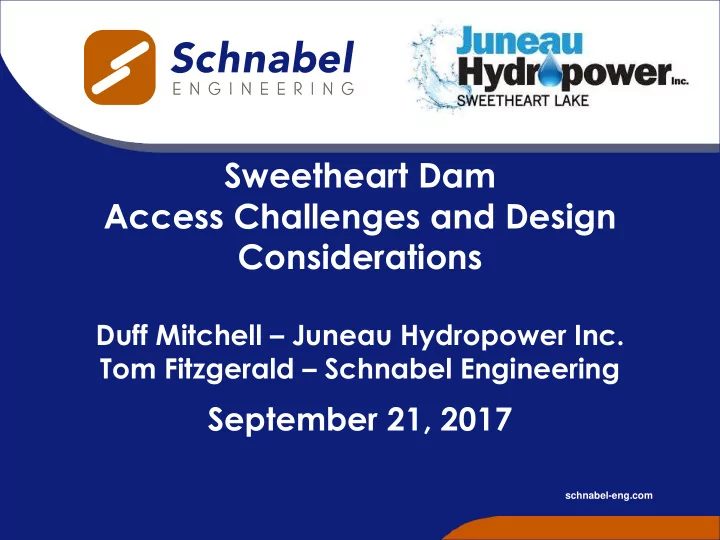

Sweetheart Dam Access Challenges and Design Considerations Duff Mitchell – Juneau Hydropower Inc. Tom Fitzgerald – Schnabel Engineering September 21, 2017 schnabel-eng.com
Agenda Project Summary and Timeline Permitting Status Project Challenges Design Concepts Recent Investigations
Sweetheart Lake Timeline Sweetheart Creek first prospected by Frank Cook, discoverer of the Jualin Mine 1906 Sweetheart Lake first identified as a hydro resource 1915 to 1927 USGS gauged Sweetheart Creek 1929 Project selected by US Government as a Federal Power Site Classification Site in Public Land Order 221 May 14, 1929. 1952 Interior Secretary reports to Congress on Sweetheart Lake 1958 USGS Plan for Damsite 1983 Alaska Power Authority Plan 1983 Environmental Impact Assessment for Gilbert Bay 2009 FERC Permit filed-development and studies commenced 2014 FERC License Filed 2015 October EIS and License Process 2016 Final EIS issued-May 31, 2016 2016 FERC License issued-September 8, 2016 2016 Army Corps of Engineers 404 Permit issued 2017 ADNR Tideland Lease Permit and Easement issued 2017 ADNR Water Rights issued
Project Features Dam Powerhouse
Dam Location Gilbert Bay Tunnel Alignment Proposed Dam Site
Lower Sweetheart Lake
Powerhouse Location Gilbert Bay Powerhouse Site
Gilbert Bay
Gilbert Bay
Gilbert Bay
Sweetheart Falls
Alaska Considerations Average High Temp = 48.1 Average Low Temp = 36.2 Precip Avg. Inches per Year = 62 Snow Avg. Inches per Year = 88 Construction Season Dam Site – June to October Powerhouse – May to November -From U.S. Climate Data – Juneau Alaska
Remote Site
Steep Topography
Tongass National Forest Roadless Rules No permanent or temporary access roads to the dam site No disturbance until the project was permitted.
Geology Site Area Lineaments Site Regional Lineaments Generally consistent with Foliation and Joint Set #1
Dam Foundation – Right Abutment Area Stop D-04 Biotite Schist and Quartzite Shear zone at Stop D-04 Stop D-20 - Laminated Quartzite
Implications for Project Strong Rock Suitable for Dam and Powerhouse Foundations and Tunneling Geologic Hazards can be Mitigated: Sedimentation, slope stability seismicity Multiple Sources of Rock Borrow Material Favorable Orientations of Compositional Layering and Joints Rock Observed does not Appear Heavily Faulted or Sheared
Engineering Considerations - Seismicity Peak Horizontal Ground Acceleration (PHGA) value used for preliminary design. Return Period Ground Motion (years) (g) 500 0.073 1,000 0.094 2,500 0.124 5,000 0.148 10,000 0.177
Deaggregation Plot
Engineering Considerations - Spillway Drainage area of 35 square miles Surface area of Lower Sweetheart Existing – 1,200 acres Proposed - 1,700 acres 100-year inflow 14,000 cfs PMF Inflow about 39,000 CFS Overflow spillway 125 feet wide at El. 636.0 (~76 feet above existing)
Engineering Considerations - Spillway PMF outflow of 20,300 cfs with 14.1 feet of head 100-year outflow 7,000 cfs with 7.4 feet of head
Construction Considerations -Diversion Fair data set Seasonal flow Low flows in winter, high flow in spring and summer. Not unusual to see peaks 1,000 to 1,200 cfs Construction duration – 1 or 2 seasons? Concrete dam Need for Low-Level Outlet
Conceptual Dam Type Selection
Dam Type Considerations Spillway needs Site geometry and dam footprint Foundation conditions Construction duration Weather dependencies Access issues and equipment needs
Benefits of RCC Gravity Dam Simple, robust design that is adaptable to the terrain. Less risk related to foundation parameters. Can be built quickly (in one season). Long term durability and performance. Can accommodate spillway needs.
RCC Considerations Aggregate source Mix design Foundation Treatment Batching and Conveying Equipment Placement Penetrations Facing system
Recent Investigations
Questions?
Recommend
More recommend